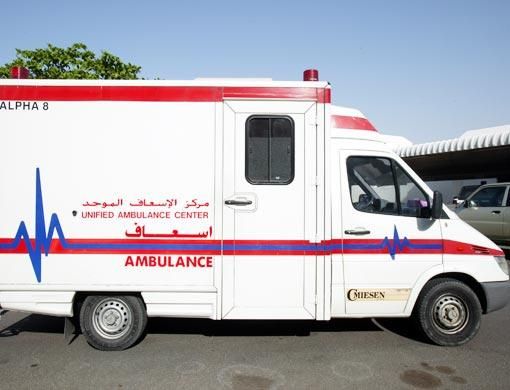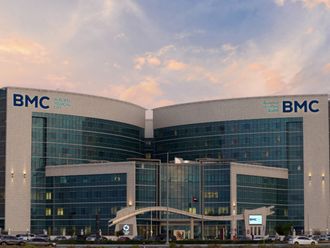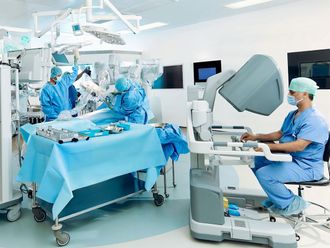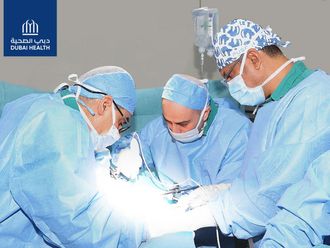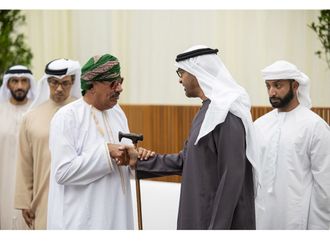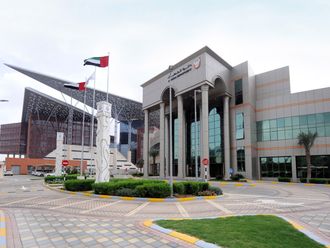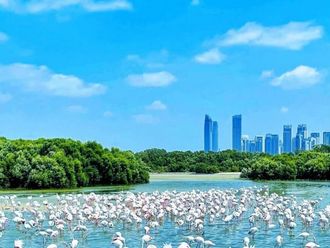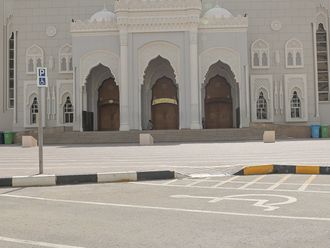Emergency medical care came under scrutiny earlier this year when a 30-year-old Pakistani man died after being turned away from an emergency ward in Sharjah. As reported in Gulf News, the man suffered a heart attack and died after he was turned away from a hospital.
But what constitutes an emergency? And what are the procedures followed in each emirate? Gulf News takes a closer look at emergency care in the UAE.
ABU DHABI
Government hospitals
Emergency cases received at Al Mafraq Hospital are sorted and each patient is categorised and classified according to the severity of the case.
"The problem is that some patients don't understand that there are some cases that are more dangerous than others and they have to be treated first. They don't want to wait but we call on them to understand the system," said Dr Jihad Abdul Jabbar Awad, emergency specialist at Al Mafraq Hospital.
General trauma cases are always treated in the emergency department. People with symptoms such as head injuries, chest pains, abdominal pains or difficulty breathing will also be treated.
Private hospitals
Emergency services at Al Salama Hospital function on a 24-hour basis with eight hour shifts; four nurses, one ambulance driver, and two doctors are available during any given shift. "There is one emergency doctor and one general practitioner. If need be, both doctors work. On average, we see about 50 patients a day in the ER," according to one doctor.
Dr Simin Behboudi Far, a general practitioner at the emergency ward Al Noor Hospital said some patients are held under observation for one or two hours. "Once we finish the investigation, we know whether to discharge or hospitalise. Triage is dynamic, we cannot tell right away." Far said that drug poisoning is classified as an emergency, as are chest pains.
"Even if we don't believe it's a heart problem we try to keep them under observation for 24 hours but they don't always accept."
During the last three months patients have doubled.
DUBAI
Government hospitals
Dubai's Department of Health and Medical Services (Dohms) has a strict set of rules defining an emergency.
"All three emergency wards in government hospitals receive over 1,000 patients per day," said Dr. G.Y. Naroo, in charge of the Emergency Department Trauma Centre, Rashid Hospital. "However it's not only emergency cases from the ambulance services — we also get walk-ins."
On-duty medical staff assess and class patients as they are admitted – triage. Rashid Hospital's high-tech trauma centre was opened last year and has seen a 25 per cent increase in the number of patients since then. Ninety per cent of Dubai's major trauma cases are transferred to Rashid Hospital, according to Omar Sakaf, training director at the Unified Ambulance Centre.
"Rashid hospital has all the facilities such as an X-ray machine which can produce the X-ray in 13 seconds so we have to transport patients there. Only rarely do we transfer patients to other hospitals," he said.
The four government hospitals in Dubai are Rashid Hospital, Al Wasl Hospital, Dubai Hospital and Maktoum Hospital. However, Maktoum Hospital does not have an emergency ward.
Private hospitals
At the Iranian Hospital a "strict set of rules" governs what should be done with emergency cases, according to staff.
"Cases such as heart attacks go through immediate triage, according to the list issued by Dohms. We can always recognise who needs to be treated as an emergency case," said Ali Reza Puryousefi, Chief of the Emergency Section at the Iranian Hospital, adding that emergency cases are immediately admitted to the ward by a chief nurse without delay.
There are usually three nurses on duty — one to administer the intravenous drip, one to monitor cardiac and pulse and one to inject medication.
SHARJAH
Government hospitals
All patients who require emergency care are seen and treated by doctors immediately and all care is provided for free in Sharjah's public hospitals.
Patients are treated "without delay," and even those with non-severe ailments are fully evaluated, according to John Burns, Chief Executive at Sharjah's Al Qasimi government hospital.
Regarding payment, "Once out of danger we tell them the estimated cost, and ask where they want to go," Burns said. Elderly patients receive a full evaluation on arrival.
In the event that the doctor needs the help of another consultant, an
on-call physician will arrive at the scene within 5 to 10 minutes to properly diagnosis the symptoms.
Trained triage nurses are posted at the door of the Emergency Room and class patients in order to receive medical attention.
Al Qasimi hospital manages all major cases in the northern emirates and last year received five road traffic accidents a day – a total of 70,000 patients.
Private hospitals
Anyone who enters the emergency room will be treated immediately according to a spokesperson for private Al Zahra Hospital. However, stab wounds, burns or roadside accident victims are considered suspicious emergency cases and such patients will only be resuscitated and kept stable. These patients cannot be treated unless it is first reported to the police, who then decide whether they should be treated at a private or public hospital.
Walk-in patients who come to hospital complaining of chest pains or similar symptoms will be immediately stabilised by the emergency staff and inform his or her relatives.
FUJAIRAH
Government hospitals
As the biggest in the emirate, Fujairah Hospital is the first port of call for many patients. On arrival people are classed according to the importance of injuries by triage nurses. Patients with minimal injuries are referred to other clinics, according to Obaid Khalfan Al Khadeem, Director of Fujairah Hospital.
"During the day, each clinic has two resident doctors, the first on-duty doctor is often a specialist who will attend to a patient and if necessary can call a second on-duty consultant," said Al Khadeem.
"We have six emergency doctors who work in shifts from 2 to 10pm, after which there is only one doctor, as it is not a busy period," he added.
The number of people coming from surrounding towns and villages as well as from nearby Oman has added to the strain on the hospital's resources, particularly the emergency ward.
Anecdotes of people deliberately avoiding the hospital in favour of smaller medical centres are not uncommon.
Private hospitals
Emergency staff face less pressure at Fujairah's GMC hospital yet resources closely match those of government hospitals.
Ahmad Al Khadeim, Deputy Director of Fujairah Medical Zone, said current emergency centres were adequate but more are planned in remote areas. "We are looking to build new medical centres in areas such as All Thoban and Al Khalibia and we will also totally redevelop centres in Al Halat and Dhedna.
"This will eliminate a lot of hardship for local communities where patients now have to travel to either Dibba or Fujairah hospitals for medical treatment," he said.
RAS AL KHAIMAH
Government hospitals
All emergencies are treated in public hospitals with life threatening cases prioritised in triage. Saqr Hospital and Obaid Allah Hospital are the only options for emergency
treatment.
"Road traffic accidents are also considered emergencies until proven otherwise," said Dr Yousuf Al Tair, head of the Accidents and Emergency Department at Saqr Hospital.
The emergency ward handles all emergencies except internal diseases, skin diseases, chest diseases (bronchial asthma), psychiatric or cardiac cases, which are received at Obaid Allah Hospital. "Our capacity is very small. The resuscitation room has only two beds whereas in other hospitals this room would have at least 10 beds," said Al Tair.
Hospitals transfer cases at the request of the patients who are then responsible for their entire transfer.
Obaid Allah Hospital in Ras Al Khaimah is the only other alternative for emergencies in the emirate. Around 180 patients are treated here everyday, of which 100 are received overnight.
Physicians in the emergency department assess the patients as they come in If they give the 'Code Blue' sign for a life-threatening case, all the concerned specialists and consultants are called in, said Dr Abdullah Yousuf Mohammad Bani Hamad, Consultant Physician and Medical Director. Non-emergency cases are treated and discharged on the spot and the bronchial cases are handled by the emergency department to stabilise the cases and prescribe medications. Hamad said two internal disease specialists are always on duty. He added that despite a second on-call consultant is always ready the hospital suffers from a serious staff shortage.
TRIAGE
Triage is the process of sorting injured people into groups based on their need for immediate medical treatment. People in more life-threatening conditions are seen to first. The system is used in hospital emergency rooms.
EMERGENCY NUMBERS
When dialing from a landline or mobile: 999 in all emirates
When dialing an emergency service in another emirate:
- Abu Dhabi 02 999
- Dubai 04 999
- Ras Al Khaimah 07 999
- Fujairah 09 999
- Umm Al Quwain 06 999
- Ajman 06 999
- Sharjah 06 999
- Al Ain 03 999


